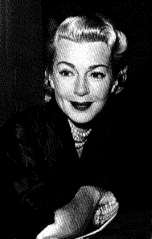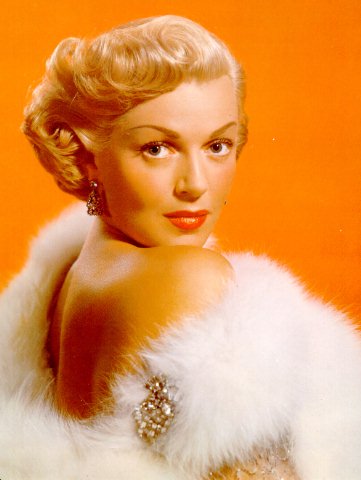
 Turner's film career began -- so the story goes -- when she was discovered sipping
soda at the fountain in Schwab's Drug Store. She was dubbed "The Sweater Girl"
after an on screen appearance walking down the street in a tight skirt and sweater in
the appropriately titled 1937 film, "They Won't Forget." A favorite pin-up girl
during World War II, Turner embodied the beautiful blonde, passionate and
troubled, with a shadowy past.
Turner's film career began -- so the story goes -- when she was discovered sipping
soda at the fountain in Schwab's Drug Store. She was dubbed "The Sweater Girl"
after an on screen appearance walking down the street in a tight skirt and sweater in
the appropriately titled 1937 film, "They Won't Forget." A favorite pin-up girl
during World War II, Turner embodied the beautiful blonde, passionate and
troubled, with a shadowy past.
 In real life, there were many shadows in Turner's world. Her father was murdered,
reputedly for gambling debts, when she was a child. She struggled with alcoholism
all her life and had many famous and a few notorious boyfriends, including
billionaire Howard Hughes, pretty-boy actor Tyrone Power, and Tarzan star Lex
Barker. Turner eventually married seven times.
In real life, there were many shadows in Turner's world. Her father was murdered,
reputedly for gambling debts, when she was a child. She struggled with alcoholism
all her life and had many famous and a few notorious boyfriends, including
billionaire Howard Hughes, pretty-boy actor Tyrone Power, and Tarzan star Lex
Barker. Turner eventually married seven times.
 In 1958 Turner's only child, Cheryl Crane, stabbed and killed Johnny Stompanato
with a kitchen knife. Turner was trying to break off the relationship. The judge
ruled justifiable homicide after hearing evidence of the violence and threats made
by Stompanato. Despite the unstable environment of the Turner household, Cheryl
was reunited with her mother.
In 1958 Turner's only child, Cheryl Crane, stabbed and killed Johnny Stompanato
with a kitchen knife. Turner was trying to break off the relationship. The judge
ruled justifiable homicide after hearing evidence of the violence and threats made
by Stompanato. Despite the unstable environment of the Turner household, Cheryl
was reunited with her mother.
Turner's scandalous personal life played havoc with her professional advancement
in the studio-driven image-conscious world of Hollywood. Her glamour girl
reputation overshadowed her talent as an actress. Although directors were aware of
her ability, the "women's roles" Turner was so often type-cast in, prevented her
from achieving the greatness many thought her capable of.
professional advancement
in the studio-driven image-conscious world of Hollywood. Her glamour girl
reputation overshadowed her talent as an actress. Although directors were aware of
her ability, the "women's roles" Turner was so often type-cast in, prevented her
from achieving the greatness many thought her capable of.
 Turner's most notable screen successes were as the "Ziegfeld Girl" (1941),
gorgeous in feathers and a fan, as the steamy double-dealing housewife in "The
Postman Always Rings Twice" (1946), and later in the noir classic, "Madame X"
(1966). She was nominated for an Oscar as Best Actress for "Peyton Place" in
1957.
Turner's most notable screen successes were as the "Ziegfeld Girl" (1941),
gorgeous in feathers and a fan, as the steamy double-dealing housewife in "The
Postman Always Rings Twice" (1946), and later in the noir classic, "Madame X"
(1966). She was nominated for an Oscar as Best Actress for "Peyton Place" in
1957.
 Even after her original film glamour faded, Turner continued to act. She had a
recurring role in the nighttime TV Soap Opera, "Falcon Crest" from 1981 to 1990.
Until illness stopped her, she performed at dinner theaters around the country.
Even after her original film glamour faded, Turner continued to act. She had a
recurring role in the nighttime TV Soap Opera, "Falcon Crest" from 1981 to 1990.
Until illness stopped her, she performed at dinner theaters around the country. 
Her daughter, who grew up to write a book about her traumatic childhood and
successful adulthood in partnership with her lesbian lover, was close to her mother
in the final years. Cheryl was at her mother's bedside when Lana Turner died.


 Return To Intimate Portraits
Return To Intimate Portraits Return To Index
Return To Index